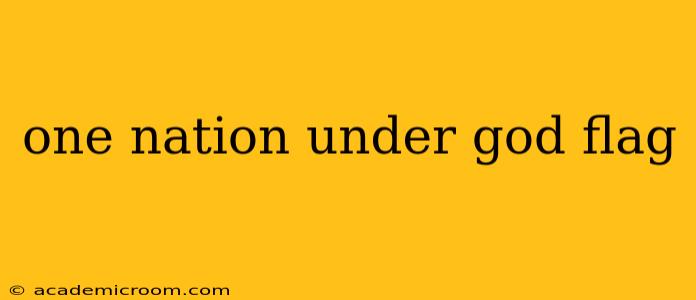The phrase "One nation under God" is deeply ingrained in the American consciousness, most prominently featured in the Pledge of Allegiance. But its history, meaning, and implications remain a subject of ongoing discussion and debate. This exploration delves into the origins of the phrase, its connection to the American flag, and the controversies surrounding its inclusion in national symbols and practices.
What does "One nation under God" mean?
The phrase itself speaks to a unified nation founded on shared values and principles, implicitly suggesting a sense of national identity and purpose rooted in a belief in God. However, the interpretation of "God" varies widely, encompassing diverse religious beliefs and even secular interpretations focusing on shared ideals and national unity. The meaning is subjective and open to individual understanding.
When was "One nation under God" added to the Pledge of Allegiance?
The phrase "under God" was added to the Pledge of Allegiance in 1954 during the Cold War. This addition, championed by Congressman Louis B. Johnson, aimed to differentiate the United States from atheistic communist regimes and to solidify a sense of national unity amidst growing international tensions. This context is crucial to understanding the motivations behind its inclusion.
Why is there debate surrounding "One nation under God"?
The debate around "One nation under God" stems from the principle of separation of church and state, a cornerstone of American governance. Critics argue that the phrase's inclusion in the Pledge of Allegiance and other national symbols violates this principle by endorsing a specific religious belief over others, potentially alienating those of different faiths or no faith. The argument centers on the perceived endorsement of a particular religious worldview by the government.
What is the relationship between "One nation under God" and the American flag?
While "One nation under God" isn't directly printed on the American flag, the phrase's close association with the Pledge of Allegiance, which is often recited during flag ceremonies, links it inextricably to the flag's symbolism. The flag itself represents the nation, and the Pledge, including the phrase, expresses a national identity often tied to the flag's presence. This connection reinforces the feeling of patriotism and national unity for many.
Is "One nation under God" unconstitutional?
The constitutionality of "One nation under God" has been challenged in court. The Supreme Court cases involving the Pledge of Allegiance have focused primarily on the mandatory recitation aspect rather than the phrase itself. The court has generally upheld the right of individuals to refrain from reciting the Pledge, even in public schools, emphasizing freedom of speech and religion. The legal landscape surrounding this issue is complex and constantly evolving.
How has "One nation under God" impacted American society?
The phrase has significantly shaped American identity and culture, contributing to a sense of national unity and purpose for many. However, its inclusion has also fostered division and debate, highlighting ongoing tensions between religious belief, national identity, and the principles of separation of church and state. The impact is multifaceted, influencing both national unity and social discourse.
What are alternative perspectives on national unity?
Some argue that national unity can be achieved without explicitly mentioning God. They propose emphasizing shared values like liberty, justice, and equality as unifying principles, inclusive of individuals with diverse religious and non-religious beliefs. These alternative approaches highlight the potential for secular expressions of national unity.
This exploration provides a comprehensive overview of the complexities surrounding "One nation under God," its historical context, its connection to the American flag, and the ongoing debates about its implications for American society. Understanding these multifaceted perspectives is essential for navigating the ongoing conversation around national identity and the role of religion in public life.
